March on Washington: Thousands gather at historic civil rights march
Thousands are gathered in Washington DC to commemorate the 1963 civil rights March on Washington and in protest of police violence with the blacks.
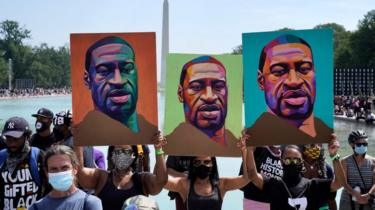
The families of black Americans shot or killed by police will speak at the same site where Martin Luther King Jr delivered his I Have a Dream speech.
Friday's event is called the Commitment March: Get Your Knee Off Our Necks, a reference to George Floyd's death.
It follows renewed protests over the police shooting of Jacob Blake.
The relatives of Mr Blake, Mr Floyd, Breonna Taylor and Eric Garner are expected to deliver speeches at the march.
They will be joined by civil rights leader Reverend Al Sharpton and Martin Luther King III - the eldest son of Mr King Jr.
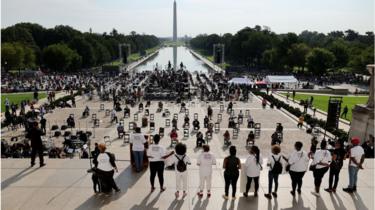 GETTY IMAGES
GETTY IMAGESThe event comes in the wake of at times violent protests over Mr Blake's shooting that have left two dead in Kenosha, Wisconsin. Mr Blake was shot and injured by police last Sunday.
Since Mr Floyd's death in May, marches in support of the Black Lives Matter movement and against racism and police brutality have swept the US and the globe.
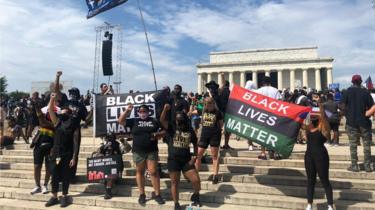
Protesters continue to seek justice for Mr Floyd, who died after being held down by police officers, one of whom knelt on his neck, and Breonna Taylor, who was shot and killed in her home when officers raided her apartment.
Democratic vice-presidential nominee Senator Kamala Harris addressed the rally virtually.

'We're in a crisis'
Attendees lined along Constitution avenue as early as 7am in anticipation of the march.
Lloyd Miner travelled from Philadelphia this morning.
"I'm here to play my role and give this administration the mandate that we mean what we say: we want change," he says.
For Rex Ikwueme there's a sense of urgency.
"We're in a crisis and we really have got to get things in order," he says. "We can't be living like this and we can't be seeing my people die on film every week. That's not normal."
"Clearly with the way that the police have been behaving in different areas of the country, they're looking at us as targets and we can't have that," he continued. "It contradicts the entire American dream."
Police violence against African-Americans is top of mind today for many marchers.
Artelia Bryant, from Roanoke, Virginia, says in her opinion, little has changed since 1963.
Bryant wants lawmakers and law enforcement held accountable for the deaths of black people in police custody.
Where do they start?
"Cops being arrested," says Bryant. "They can start with the cops that killed Breonna Taylor."

The 1963 March on Washington was a seismic event in US history, credited with spurring the passage of the Civil Rights Act outlawing segregation the following year.
Some 250,000 supporters packed the 1.9 miles (3 km) strip from Lincoln Memorial to the Washington Monument, making it one of the largest political gatherings the country had ever seen.
Rev Sharpton announced the 2020 march - which falls on the 57th anniversary of the 1963 event - at Mr Floyd's memorial service in June.
His organisation, the National Action Network, worked with Mr King III to convene the march.
The event brings together generations of activists to advocate for police reform and urge Americans to vote in the November general election.
Up to 50,000 people were anticipated to attend, Rev Sharpton said.
Given Covid-19 concerns, people have been encouraged to participate virtually if they cannot attend or in local marches taking place in other states. In Washington, there will be temperature checks and mandatory masks along with social distancing.
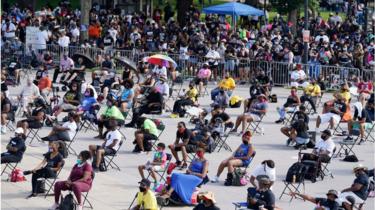 GETTY IMAGES
GETTY IMAGESIn addition, buses from states considered to be virus hotspots were not to come to the capital.
Also on Friday, activists at the Black National Convention - organised by the Movement for Black Lives, a coalition of black activists and organisations - will adopt a policy platform.
Among the initiatives on the agenda are slavery reparations, defunding police departments and investment in healthcare, housing and social services in black communities, organisers said. It was drafted by hundreds of delegates from across the country.
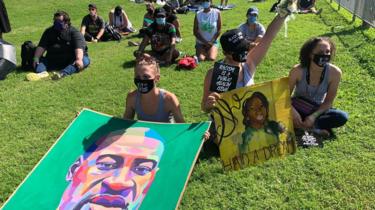
Speakers during the morning's programming included Ayanna Pressley, the congresswoman, who paid tribute to the activism of black Americans before today whose "sacrifice and self-determination shaped history and brought us to this moment."
"We are Black with a capital B," she said. "We are the manifestation of the movement. We are a symbol of social, political and cultural progress."
Other presenters included a young activist who called for an end to the gun violence that plagues black communities, and representatives from unions, gay rights groups and Hispanic activism groups who expressed solidarity with the Black Lives Matter movement.
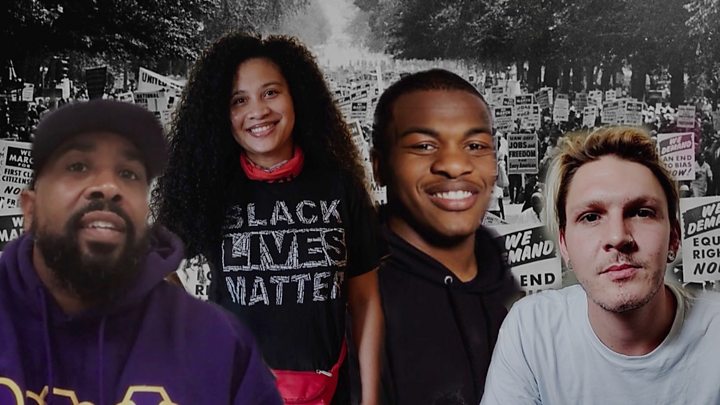
Comments
Post a Comment